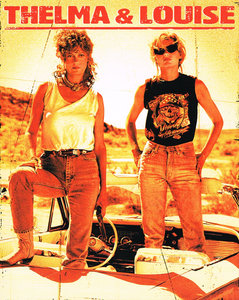


Plot certainly matches the themes of the car as both a jail and a shelter and
Thelma roadmovie movie#
If Thelma and Louise is a feminist road movie in the sense that it replaces the idea of “men and machines” with women deciding to command their own destiny to escape, its ending is a somewhat depressing reminder that the only real escape from society is death. Sexism, in the sense that attempted rape and their fear that the police will charge them with murder instead of understanding the situation as self-defense, also turns their initial trip to escape society metaphorically into amore literal form of escape. The feminist twist of the film means that sexism in the form of limited job opportunities and suffocating marriages are the initial forms of oppression from which the women flee. Like most road movies, they make the trip in a 1966 Ford, which offers ties to the richer history of the connection between the Model T and the opening of Route 66 in the 1920s. The women’s decision to take a trip west in the first place certainly reflects the traditional American obsession with the road and the West as sources of opportunity and escape from an oppressive society. Instead of following “men and machines” as a representation of progress, the film gives both women the power as they move west. Sympathetic FBI agent tries to convince both women to turn themselves in.Įyerman’s article briefly mentions Thelma and Louise as an example of a feminist version of the quintessential road movie. Progresses, Thelma falls in love with a thief who dresses like a cowboy and a Who tries to rape Thelma at one of their stops while traveling. The trip suddenlyīecomes an attempt to flee the country to go to Mexico after Louise kills a man Movie follows the story of best friends from Arkansas, Thelma and Louise, whoĭecide to take a trip west to escape their oppressive lives. Received six Academy Award nominations-and box office success in 1991. Thelma and Louise was released to critical acclaim-it


 0 kommentar(er)
0 kommentar(er)
